“All diseases arise from Qi.” Many people experience headaches, chest tightness, irritability, and various discomforts after getting angry. The root cause is often due to liver Qi stagnation.
Traditional Chinese Medicine (TCM) believes that the liver governs the smooth flow of Qi and plays a role in regulating emotions. When this function is disrupted, it is referred to as liver Qi stagnation! Liver Qi stagnation is primarily related to emotions; life is often unsatisfactory, such as marital discord, losing money while gambling, or stock market declines. If one cannot adjust their emotions and harbors anger for a long time, it leads to liver Qi stagnation!
When liver Qi stagnates, the body may exhibit symptoms such as emotional repression, excessive sensitivity, significant mood swings, chest and rib distension or dull pain. Women may experience breast tenderness and irregular menstruation, while men may face decreased libido and premature ejaculation.

Liver Qi stagnation is divided into four levels. Which level do you belong to?
Level One: Qi Stagnation and Blood Stasis!
When Qi flows, blood flows; when Qi is stagnant, blood becomes stasis. If liver Qi is stagnant, the flow of Qi is obstructed, leading to blood stasis, which manifests as stabbing pain in the ribs, masses, or a tongue that is purplish or has spots. This affects the Chong and Ren meridians, resulting in menstrual irregularities, dysmenorrhea, amenorrhea, or clots in women.
Level Two: Phlegm and Qi Stagnation!
Qi stagnation can lead to phlegm formation, which obstructs the throat, resulting in plum pit Qi. If it accumulates in the neck, it can lead to nodules (various lumps). Therefore, to regulate nodules, we must start with soothing the liver and resolving stagnation!
Level Three: Qi Stagnation Transforming into Fire!
Excess Qi can turn into fire. Prolonged liver Qi stagnation can transform into fire, leading to symptoms of liver fire rising, such as pharyngitis, swollen gums, oral ulcers, and headaches. At this time, do not forget to moxibust Taichong (LR3) and Xingjian (LR2) to drain liver fire!
Level Four: Invading the Spleen and Stomach!
When liver Qi stagnates and does not flow, or Qi stagnation transforms into a counterflow, it can affect the spleen and stomach’s ability to receive and transport, resulting in symptoms such as vomiting, belching, and distension in the chest and abdomen, as well as abdominal bloating, bowel sounds, abdominal pain, diarrhea, and unsatisfactory bowel movements.
Ten Chinese Patent Medicines for Liver Qi Stagnation
Soothing the Liver and Regulating the Spleen:
1. Si Ni San (Four Reversal Powder): Composed of Chai Hu (Bupleurum), Zhi Ke (Bitter Orange, roasted), Bai Shao (White Peony), and Gan Cao (Licorice). It disperses heat and resolves stagnation, soothing the liver and regulating the spleen. It is used for cold extremities, abdominal pain, and diarrhea. Si Ni San is a foundational formula from the “Treatise on Cold Damage” for treating liver and spleen Qi stagnation.
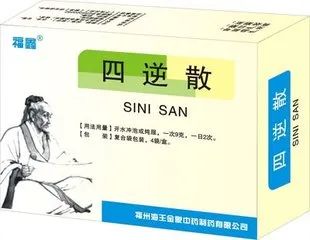
2. Xiao Yao Wan (Free and Easy Wanderer Pill): Composed of Chai Hu (Bupleurum), Dang Gui (Angelica), Bai Shao (White Peony), Chao Bai Zhu (Atractylodes, roasted), Fu Ling (Poria), Bo He (Mint), Sheng Jiang (Fresh Ginger), and Zhi Gan Cao (Honey-fried Licorice). It soothes the liver, strengthens the spleen, nourishes blood, and regulates menstruation. It is used for depression, chest and rib distension, dizziness, reduced appetite, and menstrual irregularities. The modified version, Jian Zhi Xiao Yao Wan, adds Mu Dan Pi (Moutan Root) and Zhi Zi (Gardenia) while removing ginger. It not only soothes the liver and resolves stagnation but also cools the blood and clears heat. It is suitable for liver Qi transforming into fire, with symptoms such as irritability, red face, dry throat, poor appetite, or tidal fever, as well as women’s early menstruation, difficult menstruation, and breast and lower abdominal distension. Therefore, those with internal heat and thirst should choose the modified version, while those without significant internal heat can opt for the original.
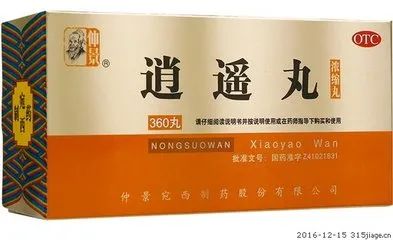
Soothing the Liver and Regulating Qi:
3. Chai Hu Shu Gan Wan (Bupleurum Soothing the Liver Pill): Composed of Fu Ling (Poria), Fu Chao Zhi Ke (Roasted Bitter Orange), Dou Kou (Cardamom), Jiu Bai Shao (Wine White Peony), Gan Cao (Licorice), Cu Xiang Fu (Vinegar Cyperus), Chen Pi (Tangerine Peel), Jie Geng (Platycodon), Jiang Hou Po (Ginger Magnolia Bark), Chao Shan Zha (Roasted Hawthorn), Fang Feng (Siler), Liu Shen Qu (Fermented Barley), Chai Hu (Bupleurum), Huang Qin (Scutellaria), Bo He (Mint), Zi Su Geng (Perilla Stem), Mu Xiang (Aucklandia), Chao Pin Lang (Roasted Pinellia), Cu San Leng (Vinegar Sparganium), Jiu Da Huang (Wine Rhubarb), Qing Pi (Green Tangerine Peel, roasted), Dang Gui (Angelica), Jiang Ban Xia (Processed Pinellia), Wu Yao (Lindera), Cu E Zhu (Vinegar Curcuma). It soothes the liver, regulates Qi, relieves distension, and alleviates pain. It is used for liver Qi stagnation, chest and rib fullness, food stagnation, and acid reflux.
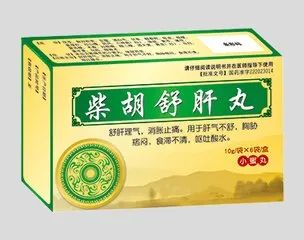
4. Shu Gan Wan (Soothing the Liver Pill): Composed of Chuan Lian Zi (Melia Fruit), Yan Hu Suo (Corydalis), Bai Shao (White Peony, wine-fried), Pian Jiang Huang (Turmeric), Mu Xiang (Aucklandia), Chen Xiang (Agarwood), Dou Kou Ren (Cardamom Seed), Sha Ren (Amomum), Hou Po (Magnolia Bark, ginger-prepared), Chen Pi (Tangerine Peel), Zhi Ke (Bitter Orange, roasted), Fu Ling (Poria), Zhu Sha (Cinnabar). It soothes the liver and stomach, regulates Qi, and alleviates pain. It is used for liver Qi stagnation, chest and rib fullness, stomach pain, nausea, and acid reflux.
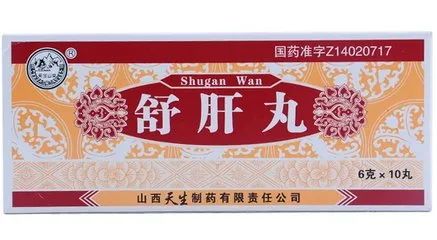
5. Shu Gan Granules: Composed of Dang Gui (Angelica), Bai Shao (White Peony), Chai Hu (Bupleurum), Xiang Fu (Cyperus), Bai Zhu (Atractylodes), Fu Ling (Poria), Zhi Zi (Gardenia), Mu Dan Pi (Moutan Root), Bo He (Mint), Gan Cao (Licorice). It soothes the liver, regulates Qi, disperses stagnation, and regulates menstruation. It is used for liver Qi stagnation with pain in the flanks, chest and abdominal distension, menstrual irregularities, headaches, dizziness, irritability, bitter mouth, dry throat, and facial dark spots (melasma) caused by liver Qi stagnation.
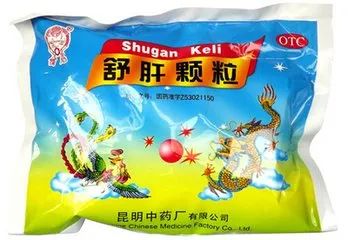
Resolving Liver Stagnation:
6. Shu Gan Jie Yu Capsules: Composed of Hypericum perforatum (St. John’s Wort) and Eleutherococcus senticosus (Siberian Ginseng). It soothes the liver, resolves stagnation, strengthens the spleen, and calms the spirit. It is suitable for mild to moderate unipolar depression due to liver Qi stagnation and spleen deficiency, with symptoms of low mood, lack of interest, difficulty falling asleep, early waking, vivid dreams, tension, irritability, reduced appetite, chest tightness, fatigue, excessive sweating, pain, white or greasy tongue coating, and wiry or thin pulse.
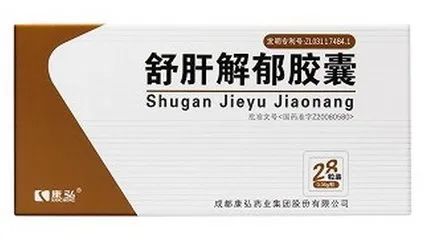
7. Jie Yu An Shen Granules: Composed of Chai Hu (Bupleurum), Da Zao (Jujube), Shi Chang Pu (Acorus), Ban Xia (Pinellia, processed), Bai Zhu (Atractylodes, roasted), Fu Xiao Mai (Floating Wheat), Yuan Zhi (Polygala, processed), Gan Cao (Licorice, honey-fried), Zhi Zi (Gardenia, roasted), Bai He (Lily), Dan Nan Xing (Arisaema), Yu Jin (Curcuma), Long Chi (Dragon’s Tooth), Suan Zao Ren (Sour Jujube Seed, roasted), Fu Ling (Poria), Dang Gui (Angelica). It soothes the liver, resolves stagnation, and calms the spirit. It is used for emotional discomfort, liver Qi stagnation, and mental stimulation leading to irritability, anxiety, insomnia, and forgetfulness, as well as menopausal syndrome.
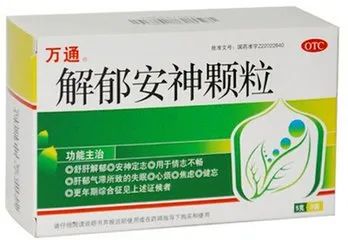
Soothing the Liver and Harmonizing the Stomach:
8. Jia Wei Zuo Jin Wan (Modified Left Metal Pill): Composed of Huang Lian (Coptis, ginger-prepared), Wu Zhu Yu (Evodia, licorice-prepared), Huang Qin (Scutellaria), Chai Hu (Bupleurum), Mu Xiang (Aucklandia), Xiang Fu (Cyperus, vinegar-prepared), Yu Jin (Curcuma), Bai Shao (White Peony), Qing Pi (Green Tangerine Peel, vinegar-prepared), Zhi Ke (Bitter Orange, roasted), Chen Pi (Tangerine Peel), Yan Hu Suo (Corydalis, vinegar-prepared), Dang Gui (Angelica), Gan Cao (Licorice). It soothes the liver and harmonizes the stomach. It is used for belching, acid reflux, and stomach pain with reduced appetite.
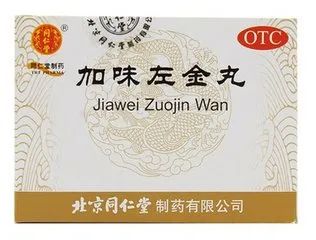
9. Shu Gan He Wei Wan (Soothing the Liver and Harmonizing the Stomach Pill): Composed of Xiang Fu (Cyperus, vinegar-prepared), Bai Shao (White Peony), Fo Shou (Buddha’s Hand), Mu Xiang (Aucklandia), Yu Jin (Curcuma), Bai Zhu (Atractylodes, roasted), Chen Pi (Tangerine Peel), Chai Hu (Bupleurum), Guo Huo Xiang (Patchouli), Zhi Gan Cao (Honey-fried Licorice), Radish Seed, Pinellia (roasted), Wu Yao (Lindera). It soothes the liver, resolves stagnation, and harmonizes the stomach to alleviate pain. It is used for liver-stomach disharmony, with symptoms of rib fullness, reduced appetite, belching, vomiting, stomach pain, and irregular bowel movements.
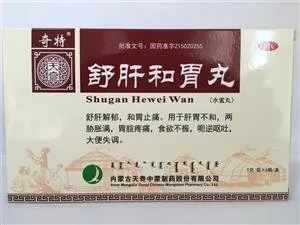
10. Xiao Chai Hu Granules: Composed of Chai Hu (Bupleurum), Huang Qin (Scutellaria), Jiang Ban Xia (Processed Pinellia), Dang Shen (Codonopsis), Sheng Jiang (Fresh Ginger), Gan Cao (Licorice), Da Zao (Jujube). It releases the exterior, disperses heat, and soothes the liver and harmonizes the stomach. It is used for alternating chills and fever, chest and rib fullness, irritability, nausea, and bitter mouth with dry throat.
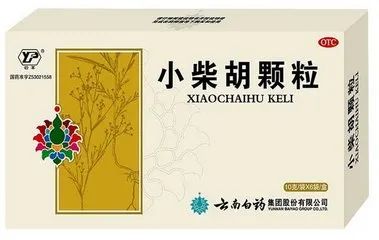
Other TCM patent medicines for soothing the liver and regulating Qi include:
Shu Gan Yi Yang Capsules, which soothe the liver, resolve stagnation, invigorate blood, and tonify the kidney, used for functional impotence and mild arterial insufficiency impotence due to liver Qi stagnation and kidney deficiency.
Dan Shu Soft Capsules, which soothe the liver, regulate Qi, and benefit the gallbladder, used for liver and gallbladder stagnation and damp-heat stomach stagnation.
Ping Gan Shu Luo Wan, which calms the liver, soothes the meridians, invigorates blood, and dispels wind, used for liver Qi stagnation and meridian obstruction causing chest and rib distension, shoulder and back pain, numbness in hands and feet, and muscle spasms.
Ru Pi Kang Capsules, which soothe the liver, regulate Qi, and invigorate blood, used for breast hyperplasia and breast tenderness caused by liver Qi stagnation and blood stasis.
Hong Jin Xiao Jie Capsules, which soothe the liver, regulate Qi, soften masses, invigorate blood, and dispel swelling and pain, used for breast lobular hyperplasia, uterine fibroids, and ovarian cysts caused by Qi stagnation and blood stasis.
Jiu Wei Gan Tai Capsules, which resolve stasis, unblock meridians, and soothe the liver and strengthen the spleen, used for rib pain or stabbing pain, depression, poor appetite, and abdominal bloating after meals due to Qi stagnation and blood stasis combined with liver Qi stagnation and spleen deficiency.
Kuan Xiong Shu Qi Hua Zhi Wan, which soothes Qi, expands the middle, and resolves accumulation, used for liver-stomach disharmony, Qi stagnation causing rib fullness, hiccups, abdominal pain, and constipation.
Ru He Nei Xiao Ye, which soothes the liver, invigorates blood, and softens masses, used for breast tenderness with lumps during menstruation, irregular menstruation, or scanty purple menstrual flow with clots, and breast hyperplasia.

